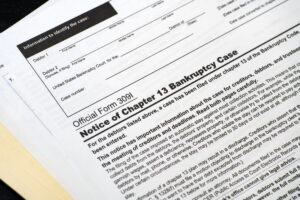Yesterday I was at a meeting of creditors with one of my clients. She was dressed as though she were going to a job interview and had the paperwork that I asked her to bring and was ready with her Social Security card and driver’s license. Even though she looked well prepared, I could tell she was somewhat nervous about the meeting. For most of my clients, the meeting of creditors is the most nerve wracking part of the bankruptcy process.
Technically, the meeting of creditors is a chance for creditors to ask debtors questions about their debt. My clients are worried about being grilled in front of a room full of strangers about the purchases they made on a credit card, or some other imagined interrogation. In practice, however, creditors rarely show up at the meeting. Even if they do, they will only have a few questions, such as what the debtor’s intention is regarding a piece of property that is securing a loan. Oftentimes, the creditor will simply call the debtor’s attorney before the meeting to ask their questions, since this allows them to avoid having to go to the courthouse to ask two or three questions.
When we finally got called by the trustee, she spoke clearly and gave direct answers. Even though she was prepared for any question that the trustee might have had, the trustee stuck to his script. He already had all the information he needed in her petition. If we were sitting with the trustee for more than three minutes, I would be surprised. After we walked out of the meeting, I got the sense that she was a little disappointed. She was ready for battle. Instead, she got asked a bunch of form questions, just like most debtors.
She is my model client. In the weeks leading up to the meeting, she and I had spoken many times, in person and over the phone. She had lots of questions about the process and her bankruptcy petition. She did her homework and responded quickly to any request to information I asked her for. She was completely familiar with her petition, was engaged in the process, and wanted to know everything that was going to happen.
My job is to help guide my clients through the bankruptcy process as smoothly as possible, and I enjoy doing so. But it is always helpful to have a client who is a partner in the process, especially since he or she is the one who is being affected. Filing bankruptcy is the first step in taking control of your financial situation. You should work closely with your attorney to make sure you understand the process. It will ensure that your case is discharged as soon as possible and allow you to start your new beginning right away.


